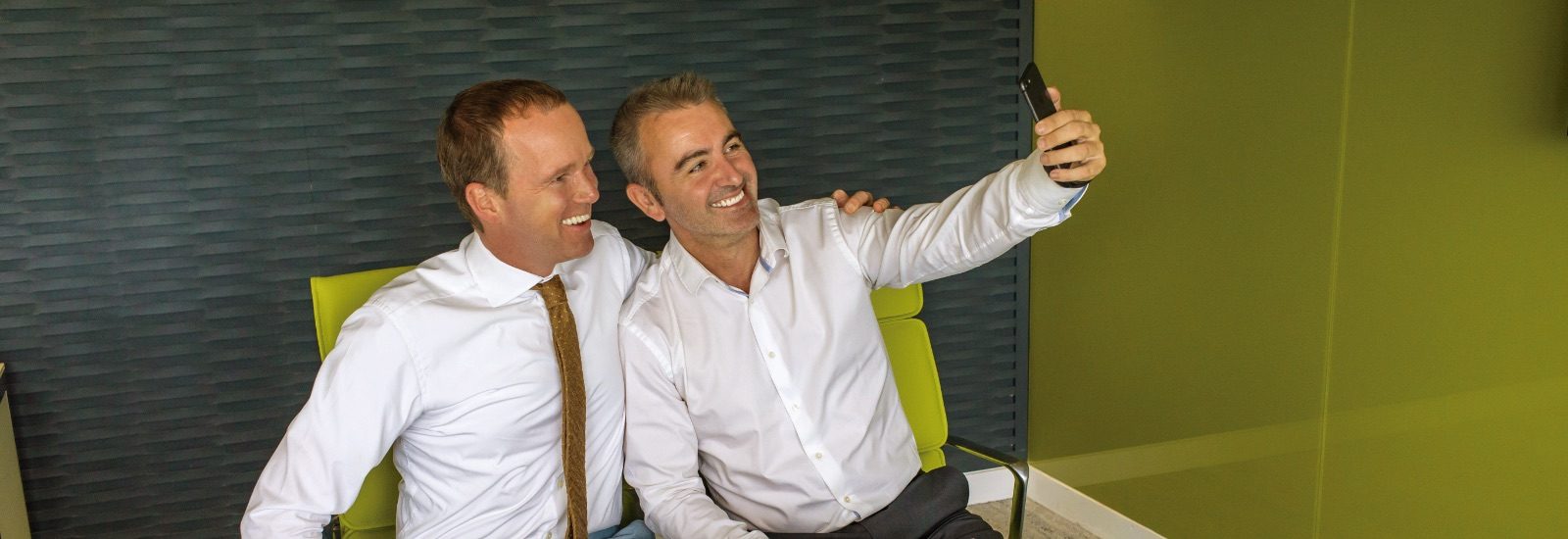Paul Esherwood Interviews Jens Amail
In his first media interview since taking the helm of the UK & Ireland operation, Jens Amail spoke exclusively to ERP Today about life at SAP, its purpose-led mission to create a better world, and what it’s like being a German running a business in the UK.

SAP is a global technology powerhouse with 425,000 customers across the world and revenues of $30bn. It provides customers with a range of software and cloud solutions and is at the forefront of the experience revolution. Last year it acquired Qualtrics in an $8bn deal which Bill McDermott, CEO, said was “the most important acquisition SAP has ever made”. Not only does SAP lead the way in experience management for its customers, it too has reinvented itself through the software and ideals that it sells. SAP is a company on a mission; it wants to sell more and drive shareholder value, but also to do more for the wider economy, society and environment. Three quarters of global GDP touches an SAP system in one form or another and this gives the company an unprecedented opportunity to influence the purchasing habits of enterprises around the world. Its mission statement to be the ‘best run’ trickles down to its customers, partners and Ariba eco-system, and is helping to drive a new purpose agenda.
I’ve interviewed a lot of people over the years; internet millionaires, celebrities, business icons and plenty of politicians. Few have been more surprising than my sit down with Jens Amail, the UK&I leader at SAP. On paper this had none of the ingredients to make a great interview, less so an interesting story. A German tech executive talking about a German tech company….I can feel readers falling asleep already. But hold on, Jens Amail is not what it says on the tin. He is funny, light hearted, patient and totally relaxed as we spend two hours discussing everything from tennis to artificial intelligence and Britpop culture.
If you look at what we have achieved in the first 18 months you will see that we have gone from being ranked 47th for employee satisfaction to now being a top 10 best place to work
Amail joined SAP in 2008 and has held senior positions in locations including China, Germany and the US. He lives in London with his wife, four children, a Chinese dog and an English cat and leads an organisation that is not just disrupting industries and enterprises with its technology, but one that has a refreshed focus on purpose and doing good – with real actions to back it up (rather than lip-service to satisfy market trends). SAP has bet big on experience having invested heavily in the acquisition of Qualtrics and is positioning itself as the leader in the race for supremacy in the experience economy. It is also heavily involved with a range of initiatives that are focussed on creating a better, cleaner and fairer world such as WRAP UK, the plastics initiative which tackles single-use plastics, and it works closely with organisations like the Prince’s Trust to drive grass-roots change.
I start the interview by asking Amail about his heritage and how it impacts his role here in the UK. His answers are surprising; not least when I learn that he has always been a supporter of the English national football team – much to the annoyance of his father.
“I’m always respectful of the fact that I am a guest in this country. I am not British and don’t own a British passport. But I have always felt like this is home. As a boy I grew up supporting the Three Lions and was fascinated with British culture. I’ve worked around the world for SAP but every location always felt temporary until I came to the UK. When my wife and I landed at Heathrow it felt like we were home and I am living out a boyhood dream of being part of British culture. I always thought life was more colourful in the UK and if I could pick any country to live in forever it would be here.”
I can well imagine the difficult conversations in the Amail household in Mannheim regarding his football allegiances, so convincing his customers to move to S/4 should be easy compared with selling the idea of supporting England to his family.
Amail is clearly a man who is comfortable in his own skin and talks openly and enthusiastically about his passions; tennis, music and his family. An avid tennis player, coached as a child by none other than Steffi Graf’s father, he still plays regularly and claims to have a flat forehand that is reminiscent of the seven-time Wimbledon champion. He also cites one of his tennis heroes – Boris Becker, when talking about getting accustomed to life in the UK and how a sense of humour helps to break down stereotypes.
“When I started my journey here I always remembered something that Boris Becker said when he was asked if he was aware that he was the most popular German in the UK. His answer was that he didn’t feel like there was very much competition for that accolade and it was a great way to bring some humour to the topic.”
I want to be able to tell them about the work we are doing with the Prince’s Trust, how we are tackling plastic pollution and how our SAP network is helping to solve some of the hardest problems in society
The list of great German humourists may be as short as the list of great English lovers but Amail’s sense of fun and adventure is refreshingly genuine for someone in his elevated position. The conversation turns to music, and again, Amail is full of surprises; he is a serious music fan and says he was hooked on the UK music scene from the moment he heard The Beatles. He explains how he personally hand picked all of the music for SAP’s InnovationX event and walked out on stage to Bowie and Changes ahead of his keynote address.
“Everything started from The Beatles but I was really into the Manchester scene in the 90s and loved listening to Oasis, The Stone Roses and The Happy Mondays. However, I’m not what we would call back in Germany ‘a sleeper’ (someone whose tastes don’t evolve as you get older). Today I still love those bands but I also listen to Sleaford Mods, The 1975 and King Krule.” Who would have thought it….?
Driving culture and values in the UK
You can’t manufacture culture. You either have it or you don’t. In a world where buyers and employees are as fickle as they are today, SAP leans on its reputation as a company with a strong purpose and a clear focus on innovation to attract top talent deliver value for its customers.
Amail said: “SAP has a very strong culture and a clear identity. We are totally customer focussed – I know everyone says that but at SAP we really mean it. We all want to do what’s right for the customer. If you look at the first 20 accounts SAP had, they are all still SAP customers today, apart from one that unfortunately went out of business. We define our success by the success of our customers. We only win when they win.”
However, one of the key tasks for Amail was to instil those values and culture from the SAP DNA into the UK business. Globally, SAP has always scored well for employee feedback ranking well on Glassdoor and other similar sites. However, the UK lagged behind the rest of the business both in terms of employee engagement and customer satisfaction.
Many of SAP’s customers and partners that operated in global markets commented that SAP in the UK felt disjointed from the rest of the business and addressing those reputational issues was the first task Amail took action on.
As a boy I grew up supporting the three lions and was fascinated with British culture. I’ve worked around the world for sap but every location always felt temporary until I came to the uk
“We were always a little bit different here in the UK. I spoke with lots of CIOs and CFOs in my first weeks and months and many of them, who also had an international background and traded with SAP globally, said they felt like they were dealing with a different company in the UK. My charter was to re-establish trust and stability throughout the partner network and with our customers. My job is to bring the best of SAP in terms of its innovation agenda, its customer focus, and bringing the best people to the UK to lead on those principles. If you look at what we have achieved in the first 18 months you will see that we have gone from being ranked 47th for employee satisfaction to now being a top 10 best place to work.”
“I’m a firm believer that the more you
talk about teamwork and collaboration the less you actually do it. I believe that the only
way to drive these things is to lead by example. We don’t have private offices here and I sit
with the rest of the team in an open plan environment. I meet customers with the account executives or presales team and don’t just turn up to sign the contract. I make a point of going for lunch every day with a different person in the SAP team. One day that might be a new recruit, a sales person, one of the engineers or someone from marketing.”
SAP’s big bet on experience
Investing $8bn in the acquisition of Qualtrics, with the firm belief that taking the high ground in experience management will keep the SAP brand ahead of its competition, is a confident bet. Although full scale technical integration between Qualtrics and the C/4HANA suite is currently in progress, the financial performance of Qualtrics is already being reported alongside other LOBs within the SAP portfolio and is very much part of the enhanced experience offering.
SAP has the deepest reach into operational data of all the tech vendors through its large customer base and Ariba platform. This huge data set coupled with the ability to provide real experiential insights will connect dots for enterprises that were previously unknown quantities. Historically, enterprises knew what was being bought, what was making money and who was performing. But there was very little appreciation into the ‘why’ of it all. Or, moreover, the ‘why not?’ Experiential data unlocks new insights into the thoughts and feelings behind buying habits and employee behaviour closing a loop in the commerce of all enterprises, that until now, had never been fully mastered. Understanding why a customer bought or did not buy is a very powerful tool. Equally, learning what motivates an employee to do well, what drives them to succeed or what caused them to leave is invaluable to organisations who rely on attracting and retaining top talent.
Ryan Smith, founder of Qualtrics, said: “If a company ignores the experience economy, it can expect to plummet as an organisation. The rise of technology has resulted in a customer base that expects more out of its services and punishes companies that don’t follow through with a personalised experience”
Bill McDermott said shortly after the acquisition that Qualtrics would fill the gap in the SAP offering and stated that experience was now the organising principle of the global economy. He said: “Every CEO I meet is trying to solve the experience gap – it’s the difference between what people expect and what they see. To deliver an experience, SAP is already the richest source of O-data, but we didn’t have X-data. This is what people want.”
And Amail was equally endorsing of the Qualtrics proposition and said: “I believe Qualtrics is the most exciting acquisition we have ever made. When I joined SAP in 2008 we were basically a one product company. We had just acquired Business Objects and one of my first conversations was about how to integrate the two businesses. Since then we have acquired SuccessFactors, Concur, Ariba and Fieldglass so we know what it takes to successfully bring other organisations into the SAP family. Qualtrics opens up a new category of software for us. We elevated ourselves through the other acquisitions with best in class products for supply chain, expenses and workforce management, and now we have an opportunity to take our offering to the next level and provide enterprises with the data they need to understand their business better. With Qualtrics we are joining together two companies with very similar cultures and ideas. I’ve met with Ryan and Jared (the two founding brothers) and we immediately had a meeting of minds on how Qualtrics and SAP would work together. Just after the acquisition was announced we were due to hold our annual senior leadership meeting, about 200 execs in total, and Bill wanted us to hold the meeting in Utah where Qualtrics is based. It was a great idea and really demonstrated our commitment to bringing Qualtrics into the SAP portfolio as a partnership.
“I like the acquisition for many reasons because I think it’s a gamechanger for what we can do for our clients. Everybody is paying lip-service to the topic of experience management. Everybody says it’s important – 80 percent of CEOs say that they deliver superior customer experience but when you ask the customers only eight percent agree. That’s what we call the experience gap. Qualtrics can help narrow that gap and provide new insights into customer behaviour and employee engagement.”
Purpose and the Millennial’s manifesto
Head of purpose is not a job title you would have heard of ten years ago. Companies of all sizes had one raison d’etre; make more money and drive shareholder value. However, the idea of having a higher purpose in business has taken hold and while not all supposedly purposeful activity has much substance behind it, SAP’s narrative (and action) on the subject is compelling.
It was noticeable at the SAP InnovationX event back in March that the language and emphasis had changed. The look and feel of the event was markedly different to a typical software vendor’s showcase. But it wasn’t the venue and décor that made it feel different, rather, it was what was being said. Amail’s keynote opening address didn’t talk about cloud revenues, new product launches or customer wins. It talked about SAP’s responsibility as a global technology company and what it was trying to do to make the world a better place. There was no glitz or glamour. No selling at all. It was a statement of intent about a higher purpose and set out an agenda that was refreshingly brilliant.
Of course, SAP isn’t turning itself into a charity and it knows that having a strong purpose-led agenda is good for business. Not just in the customers that it can engage with who share similar outlooks but also from a talent point of view. Whether you choose to call them Gen Y, Gen Z or simply young professionals, the fact remains that a lot of people born after 1980 are now the sharpest minds in the brave new world of enterprise apps, artificial intelligence and blockchain. And they want to work for an organisation that has less focus on ruling the world and more focus on making it a better place.
Stephen Jamieson – our contributing editor for innovation – and head of sustainable business innovation at SAP wrote in our last issue that by 2025 Millennials will make up 75 percent of the world’s working population. Millennials want change and are committed to doing something about it. The Millennial manifesto is different to the one their parents lived by and they will put purpose above profit and seek out a business that does good.
SAP works with 92 percent of Forbes’ Global 2000 and its technology touches three quarters of the world’s supply chain. Its Ariba network connects 3.6 million businesses and transacts more than $2.3tn of commerce where it encourages sustainable sourcing and procurement. That’s a huge lever on the global economy and SAP wants to ‘move the needle’ in a direction that has a positive impact on the economy, the environment and society at large.
Amail said: “Every company wants to do more in the world but at SAP we really mean it. We are the operating system of the world. That’s great for us but it also gives SAP an opportunity and a responsibility to do more. We work very closely with social enterprises – some of that is simple things like giving our employees days off for volunteering or working with the Ronald McDonald foundation. But the real lever SAP has is different. If you look at our Ariba network where we have transaction value of $2.3tn – we can now help them to make an educated decision to work with social enterprises – if just one percent change their buying habits as a result of our efforts, that’s $23bn that could go to social enterprises.”
I ask Amail where the momentum for SAP’s purpose-led initiatives comes from and question whether it’s a great marketing plan or if the sentiment is rooted in a deeper belief that SAP, and other tech companies, should take more responsibility for shaping the world around us.
Amail cites the founders and their principles as being key drivers but also recognises the role that the current CEO plays in keeping the SAP agenda focussed on a higher purpose. He said: “It does not hurt when the boss supports it and Bill stands behind our purpose-led agenda. But I believe it’s really part of our core DNA. We are now 47 years old and we still have a very strong connection to our founders and if you look at the work they are doing now it’s no surprise that SAP has continued with these guiding principles.
“From a personal point of view, when I go home I don’t want to tell my children about a deal that we sold; I want to be able to tell them about the work we are doing with The Prince’s Trust, how we are tackling plastic pollution, and how our SAP network is helping to solve some of the hardest problems in society.”
S/4 and the end of life for ECC
The hottest topic in the SAP world is the perceived end of life to ECC (its ERP product) and the adoption, or lack of, S/4HANA, the replacement stack of applications which can be deployed on-premise or in the cloud. SAP announced in 2014 that it would effectively bring the curtain down on ECC in 2025 in the hope that a clear roadmap would drive new sales of S/4. However, the announcement on ECC gave a slightly muddled message to customers and many felt that they were being given an ultimatum by the vendor to buy the new product, or else. You can read a full review of the S/4 story starting on page 140 in this issue so I won’t get into the detail here. However, it is worth noting that while SAP does want its installed customer base off ECC and onto S/4, it didn’t specifically say that it would kill off ECC at a fixed point. Amail concedes that the messaging could have been handled better but stresses that all its customers can trust SAP to find the right solution to help migrate to the new platform.
He said: “I look at this from a glass half full perspective. We didn’t say we will stop maintenance 11 years from now. We announced that we would extend maintenance until 2025. However, we know that some customers and partners are concerned about this and we have to take it seriously. First and foremost, we need to work with our partners and customers to demonstrate the value of S/4. Big British brands like Dixons Carphone and Dyson made the decision to invest in S/4 because they are convinced of the value and we know that many other customers will also follow suit. However, I’m not a big believer in forcing customers to do anything. We tried it before, it didn’t work, and we aren’t going to make the same mistake again. I am sure that we will find a way to do the right thing for every one of our customers.”
All set for change but some challenges remain
SAP and Amail have some challenges. But don’t we all. In his first 18 months, Amail has made big in-roads into the structural and reputational issues that SAP faced in the UK, and the company has been revitalised through a range of measures to improve employee engagement, satisfaction and performance. The introduction of Qualtrics to the C/4HANA suite adds a new dimension to enterprise insights and joins dots for CHROs, CFOs and CIOs in ways that until now were impossible. Its lead on purpose and innovation sets it apart from the other vendors who are still assessing the value and opportunity in this space and deciding where and how to position themselves – SAP is already there. SAP’s biggest challenge is S/4 and converting the product into a true cloud proposition. SAP has a very strong partner network backed by some of the biggest names in the business and they are all working extremely hard to turn S/4 into the product it was always designed to be. It will be interesting to see how many of the accelerator platforms are able to drive new sales of S/4 and whether SAP itself can reframe the proposition so that its ECC customer base ‘feels’ better about the journey towards S/4 and the intelligent enterprise.




